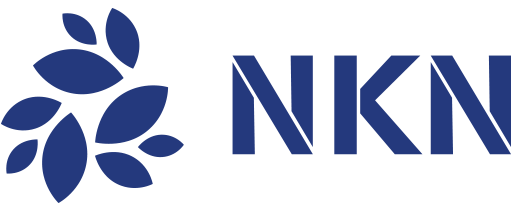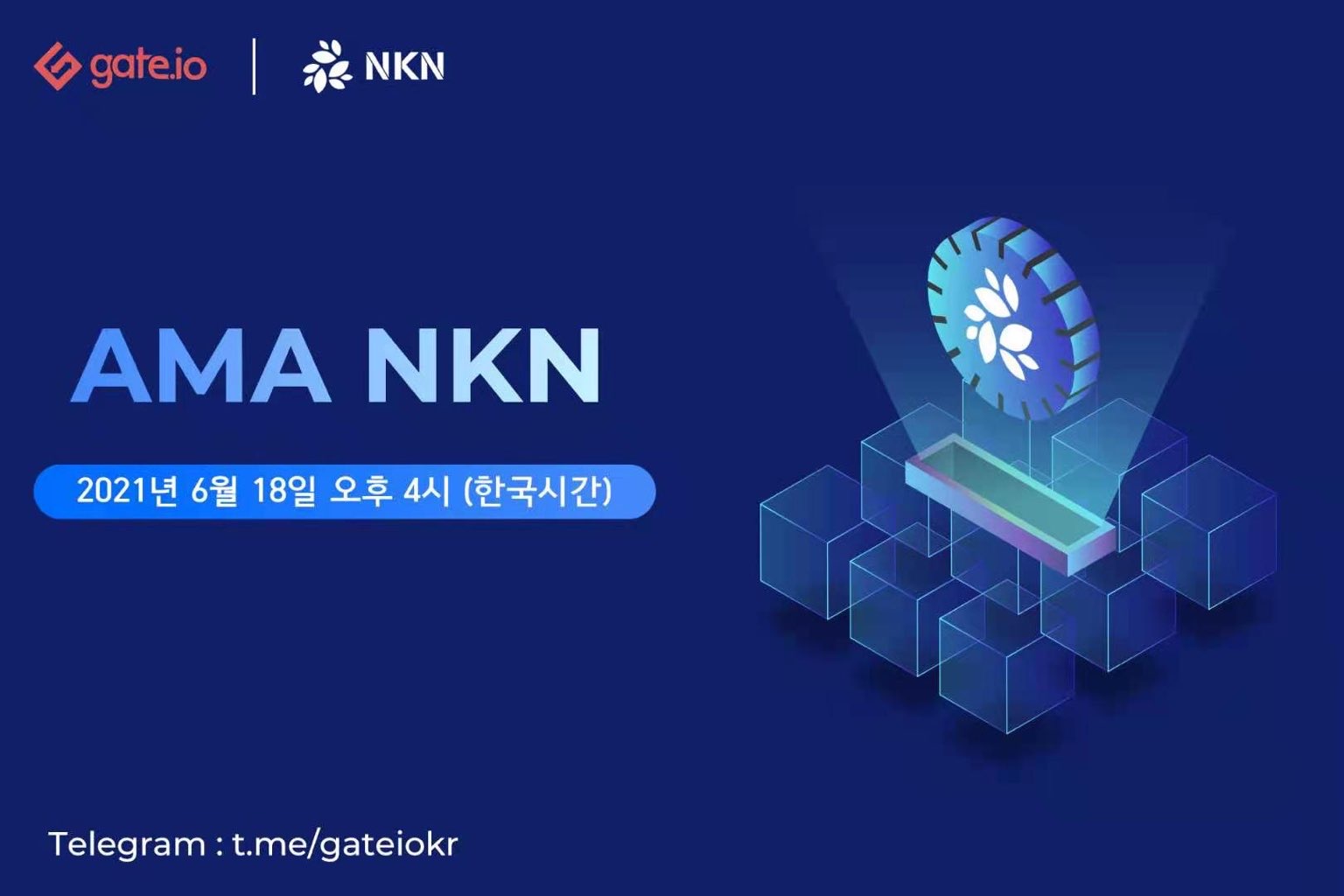
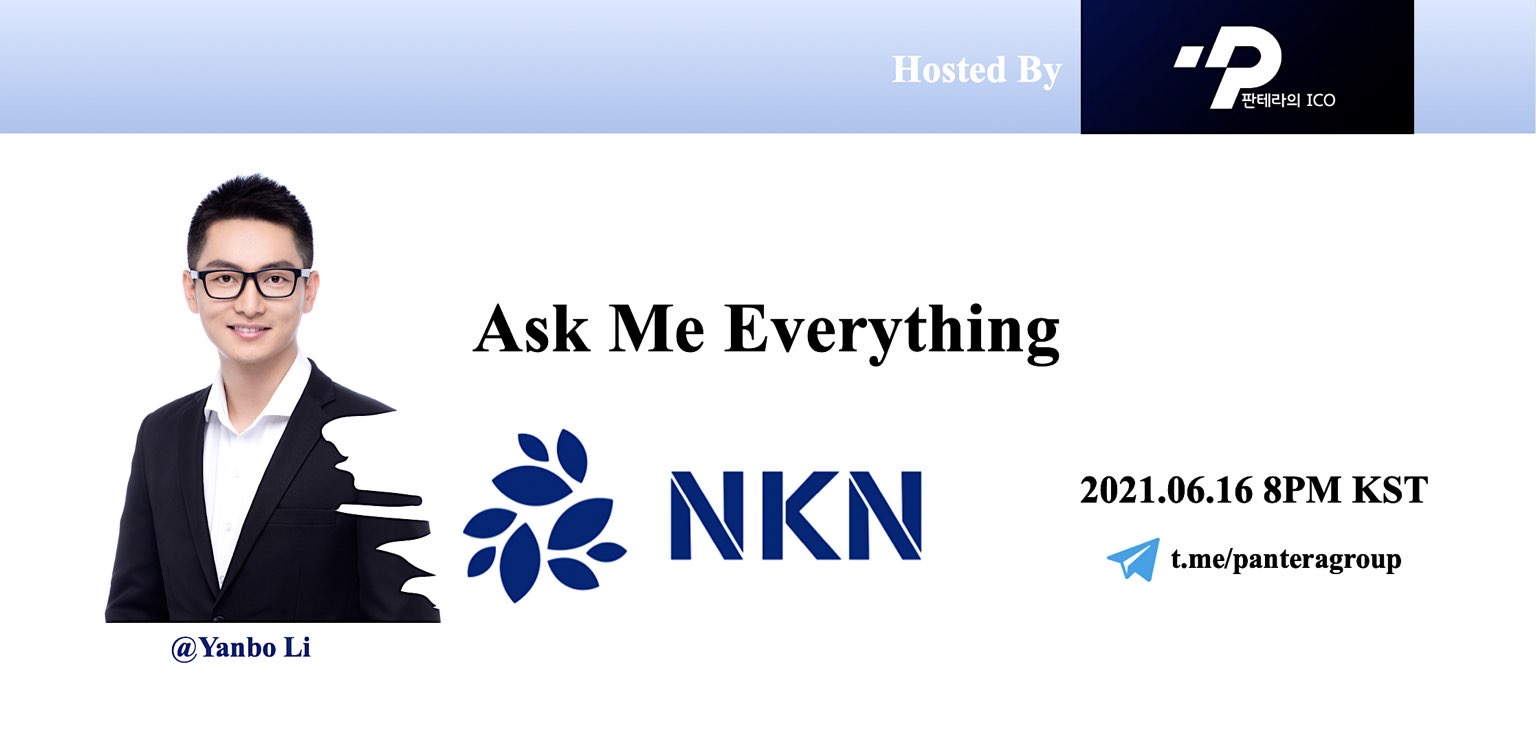
On 16th and 18th of June, we held two bilingual (English and Korean) AMAs with Gate.io and ICO Pantera group to further expand our Korean community. As guest speaker, our founder was warmly welcomed by our Korean supporters and we were flooded with curious questions about our Technology and Commercial progress.
And here we have prepared a highlight of some interesting questions we encountered during our AMAs.
Highlight Q&A
1. NKN recently created Korean community and joined Korean market. I would like to hear your thoughts on why NKN decided to create the Korean community and your thoughts on the Korean market.
NKN is a global project, where we aim to serve the whole world and have everyone benefit from a better Internet that we have always dreamt of.
Note that we are not just saying it.
As the fundamental infrastructure for Web3.0, NKN can be used in a lot broader scopes and real-world scenarios compared to other blockchain systems. Our blockchain focuses on data transmission, which is the key part of almost any modern application, e.g. IM/chat, games, social apps, etc. Therefore NKN can be adapted to almost any real world application that requires networking. This is a much larger market compared to the current crypto market that we’re familiar with.
We have reached a milestone of over 100,000 full nodes all over the world from over 47 countries and regions in March this year. We value every part of the globe, and we think it is just the right time for us to introduce ourselves to the IT power house Korea and to all our potential Korean supporters.
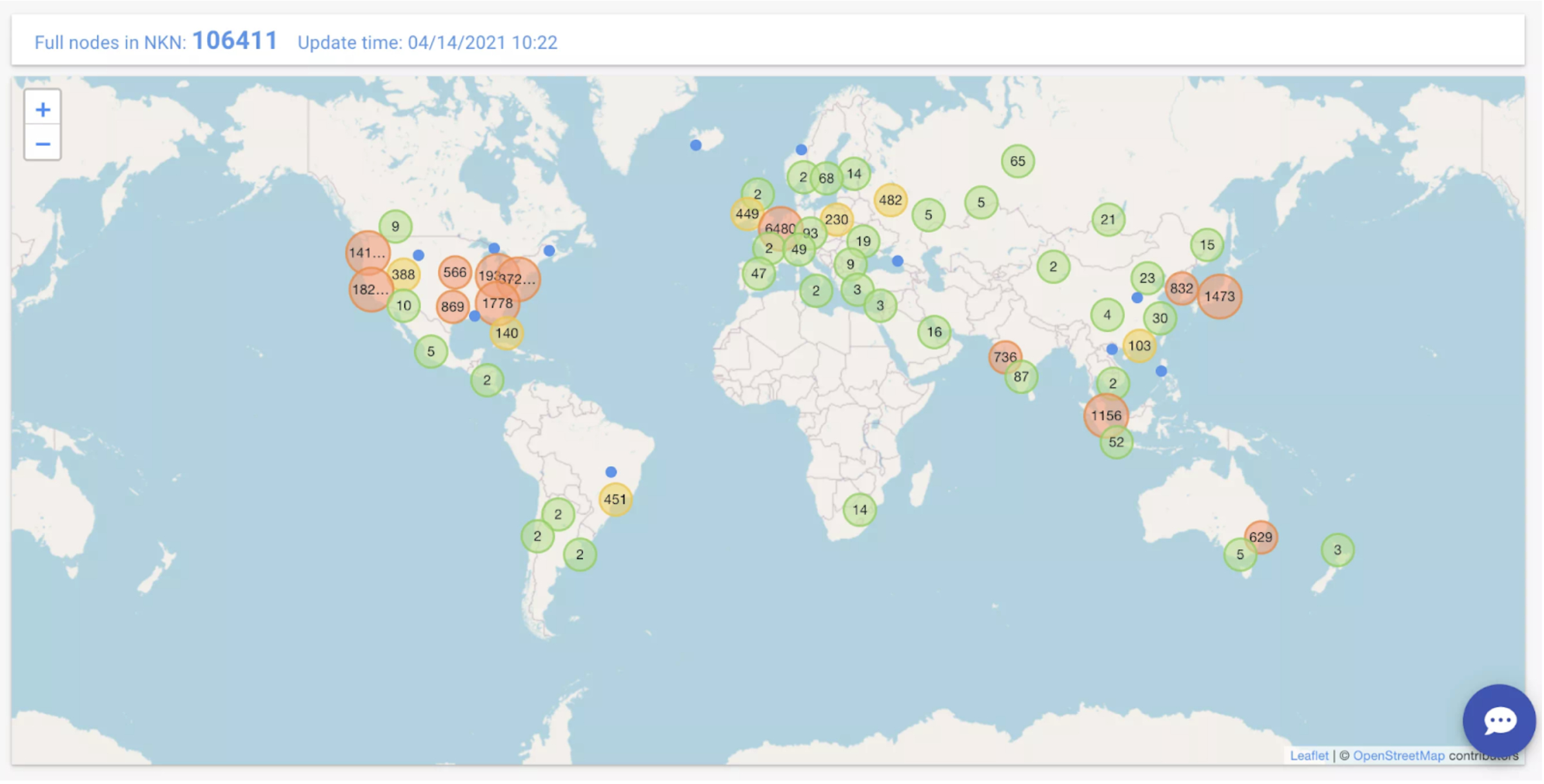
In this capture we just shared, you can see from our map that there are already more than 800 nodes in Korea. And of course this number will definitely build up with NKN welcoming more and more Korean supporters!
In addition, we believe the Korean society values innovation and risk taking. So there are lots of early adopters of blockchain and cryptocurrency in Korea. There are vibrant local Korean communities like gate.io telegram group who actively engage and discuss the future of decentralized technology. And we are working hard to bring a NKN - Korean Won trading pair to the Korean market.
We deeply believe that together we can build the Internet that we have all longed for!
2. It is said that NKN has created the world’s largest blockchain network with over 40,000 full consensus nodes worldwide. If so, I wonder if you can increase without limits to millions or even billions or more in the future.
A very welcoming update, we have reached more than 100,000 full nodes in our blockchain network on 12th of March, 2021, which further emphasized our place as the biggest blockchain in the world.
We have always believed that true decentralization is the fundamental value of blockchain networks, just like bitcoin.
Reflecting on the above, NKN network is designed to scale up to any number of nodes thanks to our MOCA consensus algorithm. We have reached the milestone of 100,000 in March, but millions or even billions will be joined in the coming future, and our code is ready for that.
We are firmly confident because of our unique MOCA (Majority Voting Cellular Automate)consensus algorithm, that can achieve near-BFT security without sacrificing scalability and speed.
But how?
It is very intuitive to understand: imagine you want to reach consensus within a large group, instead of everybody trying to scream out to everyone, all you need is sync with your neighbors and know their votes. By doing so, you can naturally change your vote to the majority of your neighbors’ vote. This is how consensus can be reached really fast under this case.
We have shown that with certain network topology, global consensus can be reached within a really short amount of time, with very little communication compared to traditional BFT consensus.
Therefore, with a neglectable amount of resources, MOCA can scale up to billions of nodes, and every one of them is able to reach consensus really fast. This is the key technology that enables us to scale up to the largest blockchain network while using much less resources. And grow without limits to millions or even billions or more in the future.
3. We know that NKN aims to provide the fastest data communication service to everyone. So, what do you think of Korea as an IT powerhouse when it comes to Internet connection quality?
Korea is definitely an important and huge IT powerhouse in the world, and as I’ve stated in the very first answer of this Q&A, we truly value all our Korean supporters. As part of our initiatives in Korea, we intend to partner with Korean IT companies to expand NKN’s network as well as to increase applications and adoption.
NKN is a blockchain network that enables sharing of connectivity and bandwidth. As we all know, the current Internet was designed for peak traffic, however insufficient network utilization results in wasting unused bandwidth. NKN uses economic incentives to motivate users to share their Internet connections and underutilized bandwidth, to contribute for a faster, better, more reliable network.
In this case, Korea, with a high quality of Internet connection not only among Asia countries but also around the globe, holds a natural advantage for becoming a key part of our blockchain network. All you need is to share your bandwidth, while optimizing efficiency of the electricity and Internet that you’re already paying for. Of course, with economic incentives earned and being a contributing factor to a novel Web 3.0 fundamental infrastructure.
4. Do you have any measures to go for in case NKN’s nodes become centralized?
NKN network is designed such that every node in the network is equal. There are no special roles like master node, super node, validators, etc. And it’s extremely easy for everyone to run a node in the network, even at home, or on small devices such as a smart router and raspberry Pi. This makes NKN the largest and the most decentralized blockchain in the world, and it is very unlikely for it to become centralized by design.
5. Recently, the Internet market has been very problematic. For example, the damage caused by personal information leakage is increasing. As NKN is a network connection protocol, I think privacy is a very important part. What are the ways for NKN to solve this problem?
Privacy is indeed an essential part in the future Internet market, and NKN has always been very aware of that.
We could confidently say that the NKN blockchain network guarantees 100% privacy with no doubt. And here’s the points on why we could be so certain:
- Our novel public blockchain is fully peer-to-peer and decentralized, with total no need to develop or run centralized servers. Zero server grants 100% security while removing a single point of failure as well as a centralized target for attacks and hacking.
- We use end-to-end and hop-by-hop encryption without public key infrastructure or 3rd party certificates, promising an additional security layer.
- NKN blockchain works without direct use of an IP address, data is stored only in local devices, which always provide best protection of privacy and security.
Taking one of our existing product nConnect as an example, it is a distributed service hosted on NKN’s global network that creates an end-to-end secure tunnel for your home servers and devices without exposing any information to the open Internet. 100% security guaranteed where all data is end-to-end encrypted and never stored in any cloud. A little FYI, We have signed commercial contracts with top 3 NAS vendors: Synology, QNAP, and ASUS and nConnect is available as a subscription service on their app stores.
We have also published an nMobile app, an extra secure and trusted chat that is totally decentralized. It is a kind of crypto equivalent of the Signal messaging app. Instead of “don’t be evil”, we have made this App “can’t be evil”.
I think You could always count on NKN for 100% privacy and security.
6. What kind of algorithm is the MOCA consensus algorithm that NKN says? Why did you change from the existing algorithm to MOCA?
We have applied our MOCA(Majority vOting Cellular Automata) algorithm from the very beginning of our project, it is way more scalable than any other consensus algorithm in terms of network size. Actually MOCA is the only consensus algorithm that works with our current network size.
It is very intuitive to understand: imagine you want to reach consensus within a large group, instead of everybody trying to scream out to everyone, all you need is sync with your neighbors and know their votes. By doing so, you can naturally change your vote to the majority of your neighbors’ vote. This is how consensus can be reached really fast under this case.
We have shown that with certain network topology, global consensus can be reached within a really short amount of time, with very little communication compared to traditional BFT consensus.
Therefore, with a neglectable amount of resources, MOCA can scale up to billions of nodes, and every one of them is able to reach consensus really fast. This is the key technology that enables us to scale up to the largest blockchain network while using much less resources. And yes, our growth is certainly indefinite. It also enables our node to run on almost all hardware you can find, from a smart router to raspberry Pi.
7. In the current Internet environment, IP is required and used universally. Then how does NKN operate without using the IP address directly?
NKN indeed has its own address protocol, which is unique to each NKN node or NKN client. NKN is running on top of the existing TCP/IP protocol, thus client and nodes will negotiate the physical hop via IP address. But applications (which use NKN client) only need to know the NKN address of the corresponding party, and do NOT need to know his/her IP address. NKN address is static and does not change even if the client’s IP address is changed.
NKN blockchain with over 100,000 full nodes all over the world forms a global overlay network architecture that automatically sets an optimized path for any transaction you make with an unique NKN ID.
8. NKN’s nMobile messenger function is interesting. In particular, it is said that backtracking is impossible because 100% anonymity is guaranteed, but recently in Korea, there have been cases where anonymity and tracking are difficult and encrypted to be used for crimes. What measures can NKN suggest in that regard?
NKN’s contribution to transmission is like building a really nice and smooth network highway.
We guarantee a good infrastructure where users’ privacy and security could be well protected. We cannot be evil due to the characteristics of our novel blockchain but “evil usage” will be out of our reach and responsibilities.
Fighting criminals who abuse communication privacy is very important. Crime cannot exist only in cyberspace because they always have a physical connection to real persons in the real world. Therefore, communication privacy will not protect their crimes.
9. There are over 40,000 nodes in the nkn. The fact that there are many nodes in the trilemma problem of blockchain can secure stability, but we have to give up in terms of speed. What solutions does NKN have to these problems?
Actually, we have reached more than 100,000 full nodes in our blockchain network on 12th of March, 2021, which further emphasized our place as the biggest blockchain in the world.
The trilemma problem was a major challenge for the traditional blockchain industry, and it is very true that speed is sacrificed for the sake of stability.
However, with the NKN novel public blockchain, we could secure stability, ensure scalability with a guarantee of high speed consensus thanks to our unique distributed consensus algorithm known as MOCA. It can achieve near-BFT security without sacrificing scalability and speed.
With MOCA, consensus is reached by comparing the state of each node with the state of just a small number of neighbors only, instead of all the nodes in the network. If a majority of a nodes‘ neighbors have a different state, that node will change its own state to the majority state and send an update to its neighbors. This is similar to neighbors in the real world. If your neighbors are SF Giants fans, then you are likely to become a Giants fan as well. Consensus is typically reached in just a few iterations < 2–3s, where each iteration is bound by the longest delay in the network (typically <1s) and scalable to millions of nodes.
MOCA consensus algorithm allows every NKN node to work both independently and collaboratively at the same time. This ensures them to reach consensus at a very high speed while enabling unlimited scalability.
If you are interested, you can check Yilun’s talk at Wolfram’s Distributed Consensus with Cellular Automata & Related Systems Research Conference.
10. A large independent relay node is required for NKN’s DDTN operation. How is this node organized? Does it mean that nodes with certain qualifications or conditions should participate instead of existing nodes because they are key to running the system?
All nodes in the NKN network are equal, and there are no special nodes such as super nodes or validator nodes. There is no staking for NKN nodes either. So new nodes and existing nodes will both participate in the data relay function as well as consensus.
Each time a node joins the network, it is given a new unique NKN address based on factors such as its public key, private key, and current blockchain. The network uses this NKN address to help route traffic via neighbor nodes between sender and receiver. The method that we use for routing is called Chord Distributed Hash Table (Chord DHT) .
You can think of our network as a ring, where nodes are placed on the ring in order running clockwise based on their NKN address (see figure below).
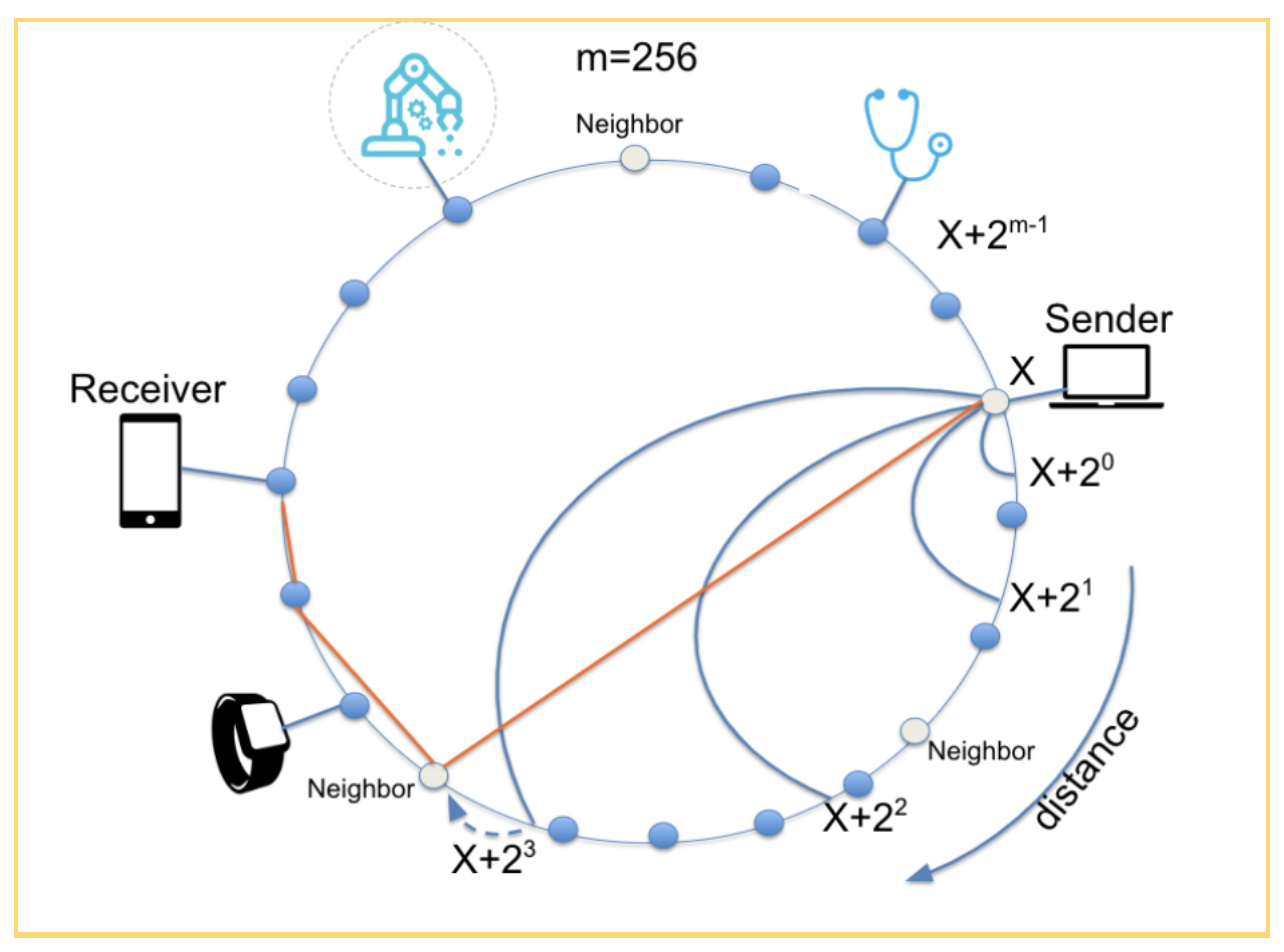
When a sender using NKN’s client sends data to a node in our network, that node will route data to the neighbor that is closest in distance to the receiver. It finds this neighbor by conducting a search in intervals of 2n distance starting from its current location and moving clockwise around the ring. Once it locates the neighbor closest to the receiver it forwards the data. That neighbor node will likewise relay data to its neighbor closest to the receiver, so on and so forth until the data is finally delivered to the receiver.
11. NKN claims that using their blockchain can use less electricity unlike eth and btc. How is this possible? Please explain it easily.
First of all, the reason NKN uses almost no electricity compared to Ethereum is because our MOCA consensus algorithm enables efficient consensus without relying on Proof of Work.
NKN uses Proof of Relay, which means all nodes are relaying traffic on behalf of the network. This is useful work that benefits everyone so they can get better and faster Internet connection. NKN nodes do not need to use a lot of computing power for hash calculation, thus the consumption of CPU power as well as electricity is negligible.
NKN is a blockchain network that enables sharing of connectivity and bandwidth. As we all know, the current Internet was designed for peak traffic, however insufficient network utilization results in wasting unused bandwidth. NKN uses economic incentives to motivate users to share their Internet connections and underutilized bandwidth, to contribute for a faster, better, more reliable network.
In order to contribute and become a part of our NKN network, all you need is to share your unused part of bandwidth with nothing else.
It is for sure that using/contributing to the NKN blockchain does not require a bunch of electricity use, instead it optimizes efficiency of the electricity and bandwidth that you’re already paying for.
12. NKN offers a variety of languages for software deployment. Supports languages such as JAVA / C++ / Python. Recently, with various projects for Web 3.0, the number of platforms using Rust is increasing. Do you have any additional plans to support Rust?
Yes we intend to have Rust SDK for NKN in the near future and most likely will be done via community developer bounty.
13. I heard that NKN has updated the mainnet. Could you explain in an easy way what has been strengthened?
In short, there were several NKN mainnet upgrades recently that greatly enhanced the network security. A few mechanisms, such as generating ID fees, enhanced signature chain verification, etc, were introduced to make the network much safer than ever.
Looking ahead, there are even more enhancements coming to NKN’s mainnet. One of the bigger items is smart contract support and virtual machines, which will enable us to build bridges to Ethereum and other major blockchains.
For more information, you can check out our roadmap beyond 2020:
